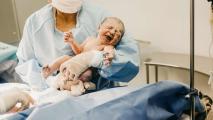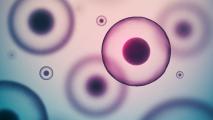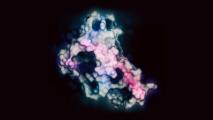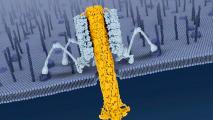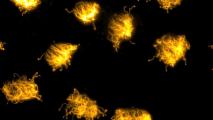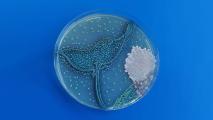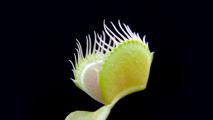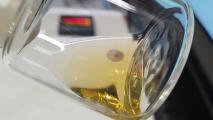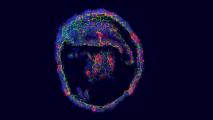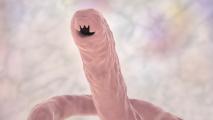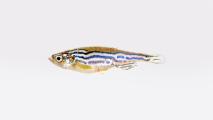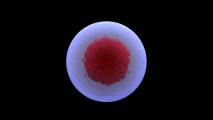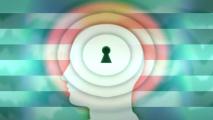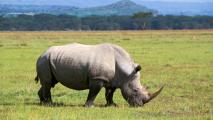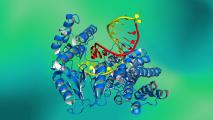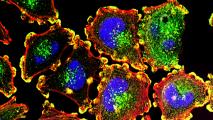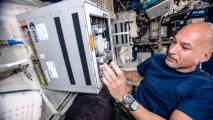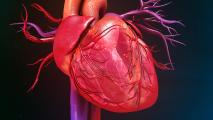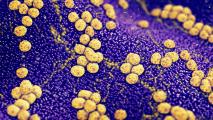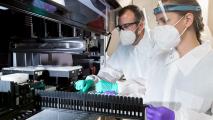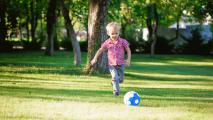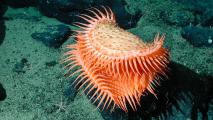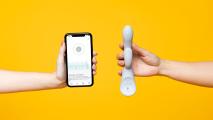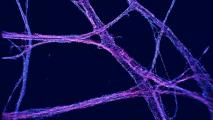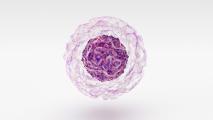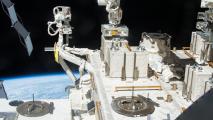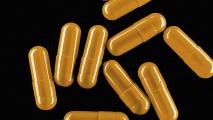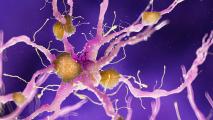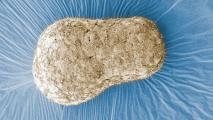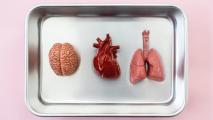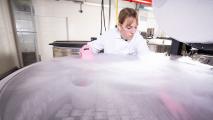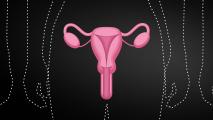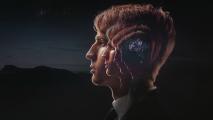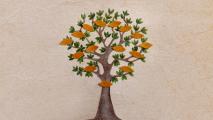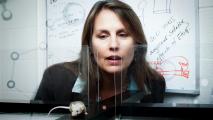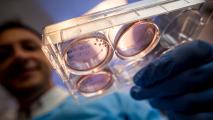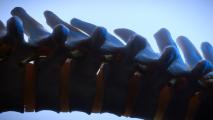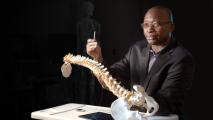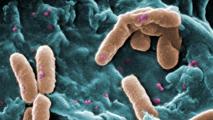Field: Biology
Supercentenarians’ DNA reveals clues to human longevity
A human longevity study involving people over the age of 105 has found that genetic variants linked to DNA repair appear to contribute to a longer life.
"Octopus vision" may help prevent human blindness
A new medical device that gives optometrists a fast, easy way to monitor a key macular degeneration risk factor was inspired by octopus vision.
New blood test could predict the onset of labor
Stanford University researchers have identified blood-based biomarkers that can be used to predict the onset of labor in pregnant women.
Customized stem cells could show us how dementia happens
By turning human cells into induced pluripotent stem cells, researchers hope to finally map the genetic path to Alzheimer’s disease.
Scientists may have figured out how to fight prion disease
Researchers believe they have found a spot on a mutated prion protein that can lead to brain-spongifying disease.
Bacteria nanomachines fire smart missiles that could replace antibiotics
Researchers want to use bacteria-made nanomachines called tailocins to help fight enemy bacteria strains in the human body.
Nobel prize-winning chemist helps invent synthetic mucus
Mucins, the long proteins in mucus, have an array of bacteria-fighting properties. These artificial mucins can act like the real thing.
The next generation of living machines: xenobots 2.0
Made from the stem cells of a frog, “Xenobots” are tiny living machines. And researchers have just debuted version 2.0.
Stunning “agar art” grows pictures with bacteria and fungi
Agar art lets scientists tap into their creative sides by growing microbes into beautiful bioart scenes in petri dishes.
Researchers have developed a “plant communication” device
Plants emit weak electric signals. Researchers have developed a device to read and send signals back — a type of “plant communication.”
Researchers have grown a mouse embryo in a bottle
Researchers have grown a mouse embryo outside the uterus for longer than ever before, opening up the door to learning more about how mammals grow.
Scientists grow tear gland organoids that can actually cry
Researchers have grown tear gland organoids that can actually cry, a potential breakthrough in the treatment of dry eye disease.
Biologist infects himself with parasites in pursuit of hookworm vaccine
A marine biologist intentionally infected himself with parasitic hookworms and documented it in Tweets and pictures that will make your skin crawl.
These mutant zebrafish are growing arm bones
While studying mutant zebrafish, scientists discovered that a single genetic mutation caused the fish to start developing the beginnings of arms.
Smart stem cells made from fat have the power to heal
Researchers have reprogrammed human fat cells into adaptive smart stem cells that can lie dormant and heal various tissues.
Deep brain stimulation can treat OCD without drugs
Stimulating the brain with electricity could be a treatment for OCD. Researchers test electrical stimulation to reduce compulsive behavior.
Can science save the northern white rhino?
The northern white rhino species is down to just two members, both female. Can science bring it back from the brink of extinction?
DeepMind AI cracks the code of protein structures
A protein’s structure is crucial to its function. Predicting how a protein will fold was a challenge decades in the making — and answered by DeepMind.
New skin cancer vaccine is twice as powerful
By adding two “boosters” to an in-development skin cancer vaccine, scientists may have improved its ability to prevent melanoma recurrence.
Bacteria could make space mining 400% more efficient
Using a bioreactor packed with bacteria could make space mining more efficient by speeding up the extraction of elements from rock.
New vanishing wound dressing heals skin with minimal scarring
A new kind of hydrogel dressing improves wound healing and minimizes scarring by kicking the adaptive immune system into gear.
The most detailed map of the human heart
A new map of the human heart details the function and location of 500,000 cells, providing a valuable tool for researchers studying cardiovascular disease.
New “universal” diagnostic test can ID any infection
UC San Francisco scientists have developed a new diagnostic test that uses DNA sequencing to quickly identify any pathogens in any type of patient sample.
Earwax gives doctors easy access to cortisol levels
The Trears device could make it easier for doctors to monitor cortisol levels by allowing patients to extract their own earwax samples for analysis.
Blood test for Alzheimer’s now available at doctors’ offices
For the first time, a blood test for Alzheimer’s disease has received approval to be used in doctors’ offices in the U.S.
Green space at daycare gives city kids an immune boost
Adding a green space to an urban daycare’s playground can boost a child immune system after just 28 days.
Researchers have never seen the deep sea like this before
Researchers are putting lowlight 4k cameras on remotely operated vehicles to capture videos of deep sea bioluminescence.
A microevolution is happening in humans right now
More humans are being born with a third arm artery, an example of microevolution happening right before our eyes.
Smart vibrator helps scientists study female orgasms
The Lioness Sex Research Platform is helping scientists study female orgasms by providing anonymized data collected by a smart vibrator.
New data visualization tool lets scientists “walk” inside cells
A new data visualization tool called vLUME recreates tiny objects like cells and neurons in a virtual world, allowing scientists to then explore them in VR.
Common mouth microbe appears to trigger cancer metastasis
Scientists are finally starting to understand the connection between the common oral microbe fusobacterium and colon cancer metastasis.
The race to get artificial blood into patients’ veins
Artificial blood could help address blood shortages while overcoming the limitations of donated blood, which has a relatively short shelf life.
Could a single injection send diabetes into remission?
Research has found that a single surgical injection of a protein into the brain can restore blood sugar levels and send diabetes into remission, for rodents. This could transform the lives of people living with diabetes.
The world's first living machines
The world's first living robots may one day clean up our oceans.
It's now easier to see individual atoms, thanks to new tech
With improved tech, two teams have sharpened cryo-electron microscopy to be able to see individual atoms.
Did life on Earth travel here from Mars?
Bacteria that survived on the outside of the ISS for three years suggests that panspermia is still a viable theory for the origin of life on Earth.
Fecal transplant cures man whose gut made him drunk
A fecal transplant cured a man of auto-brewery syndrome, a rare condition in which the gut converts carbs into alcohol, making a person feel drunk.
Scientists grow mini human hearts from stem cells
Mini human hearts grown from stem cells, also known as "heart organoids," could help doctors address the most common kind of birth defect in humans.
Study may explain why cancer gets more aggressive as we age
A molecule in the blood of older people promotes the spread of cancer, which could explain the link between age and metastatic cancer.
This smart pill could unlock mysteries of the human gut
A new smart pill can be programmed to collect gut microbiome samples from anywhere along the GI tract — overcoming a major research problem.
New blood test for Alzheimer’s is as accurate as brain scans
A new blood test for Alzheimer’s is as accurate as the costly, invasive, and time-consuming methods currently used to detect the disease.
Scientists 3D print a heart pump that can beat on its own
Scientists 3D print a heart pump capable of beating on its own — and the organoid could have a big impact on heart research.
Building a factory for human organs
Tissue engineering and regenerative medicine experts are working to mass-produce human organs through the ARMI consortium.
“Pussypedia” demystifies the female anatomy
“Pussypedia” is a free, bilingual, gender-inclusive encyclopedia of highly accurate, easy-to-understand women’s health resources.
Embryo model unlocks “black box” of human development
This ethical model of a human embryo provides a look at a never-before-studied stage of embryonic development: gastrulation.
How organoids are helping scientists fight the coronavirus
Researchers are turning to organoids — lab-grown clumps of cells that mimic human organs — in an effort to better understand the coronavirus.
New 3D bioprinting method uses light to grow ears in mice
A new 3D bioprinting technique uses near-infrared light to trigger a bioink to form shapes, even when placed under the skin of mice.
Scientists reveal first 3d heart model that shows heart’s neurons
Researchers built a virtual 3D heart model in unparalleled detail, mapping the neurons for the first time.
Bats are not the enemy
Researchers are developing options from the domestic to the deific to allow humans and bats to live together in...
Stem cell research breakthrough opens path to growing human organs in animals
New stem cell research has revealed a way to coax human cells to grow to maturity in mouse models, a major advance in the field.
Microbe in mosquito guts completely blocks malaria parasite
Scientists have discovered a microbe in the guts of mosquitoes that appears to prevent the most common malaria parasite from infecting the insects.
Bioengineered blood soaks up toxins inside the body
Tiny sponges that look and act like red blood cells remove toxins from the body.
Researchers are rushing to freeze… lab mice sperm?
With their labs closing and the future unclear, researchers are sending precious cargo — the sperm of lab mice — to be frozen and stored.
Your new sex ed teacher is a chatbot
This chatbot is filling in gaps in sex education by talking with teens to answer awkward questions about topics like health, sexuality, and identity.
Can green light therapy cure chronic pain?
Scientists are finding that exposure to the color green, also known as green light therapy, could provide natural chronic pain relief.
Series|
The Edge
Eye tracking gives athletes an unprecedented edge
With eye tracking technology, athletes can now monitor, analyze, and train their eye movements to effectively reduce their average reaction time.
The strange science of sports recovery with Christie Aschwanden
From infrared pajamas to cryo chambers, athletes swear recovery methods give them an edge on the playing field. But what does science have to say about it?
Unlocking the mysteries of muscles in motion
New kirigami-inspired skin patch may help people avoid injury, as it expands our understanding of muscle activity.
Series|
Catalysts
Rethinking addiction recovery with fitness
In partnership with Stand Together
As drug overdose deaths climb higher, this gym is challenging the thinking behind traditional models for addiction recovery services with free memberships open to anyone sober for at least 48 hours.
Series|
Future of Fertility
Uterus transplants: A step closer to overcoming infertility
About 1 in 500 women have a condition that prevents pregnancy called absolute uterine factor infertility, but recent developments show promise that a uterus transplant surgery could be the solution.
We may have found a drug to curb meth addiction
Meth addiction is on the rise, so this team of researchers is working to develop the first FDA-approved medication to treat the use disorder.
Diving deep into the brain to measure neurotransmitters
Researchers are taking the first measurements of neurotransmitters in active human brains, using computational psychiatry to understand how the mind works.
Shedding the stigma of substance use
In partnership with Stand Together
By achieving fitness goals together, The Phoenix community is peeling off the shame, regret, and stigma often associated with addiction.
Breaking the taboo of male infertility
Male infertility contributes to up to half of infertility cases. Why is it so hard to talk about?
For childhood cancer survivors, adult fertility isn’t a given
Experimental procedures offer beta solutions for girls, and more time to figure it out for boys.
A molecular biologist discusses the morality of gene editing
Molecular biologist Daisy Robinton speaks out on our moral imperative to solve some of humanity's greatest health threats.
Series|
Future of Fertility
IVG: making babies from skin cells
The designer babies of the future are closer than we think. With a new process called IVG, a person could essentially choose their baby’s traits, and same-sex couples could make a biological family.
Addict-turned-neuroscientist on addiction and the brain
In our interview with neuroscientist Judith Grisel, she discusses the state of research on addiction and the brain, as well as society’s view of addicts.
Scientists grew a mini brain in a lab. It has human-like brain waves.
For the first time, a lab-grown mini brain has brain waves. Researchers can now launch new ways to study brain disorders. But the question of consciousness in the brain-like organoid could raise concern.
Hope grows for patients with spinal cord injuries
Severe spinal cord injuries resulting in total paralysis are usually considered permanent, with no hope of recovery. And yet, in a handful of patients spanning multiple levels of severity, movement is being regained.
Series|
Superhuman
Spinal implants: Helping the paralyzed walk again
Walking after complete spinal cord injury used to be a far-fetched dream. But, with advances in spinal cord implants for paralysis, even paraplegics have been able to regain mobility and walk again.
The plan to wipe out mosquitoes using genetic engineering
The world's richest and poorest people are teaming up against humanity's deadliest predator.
Training the body to fight off drug-resistant bacteria
A new strategy, called host-targeted defense, could help solve antibiotic resistance by upgrading the immune system.
What is cystic fibrosis—and what is it like?
What you need to know about this genetic disease, explained by someone who knows it inside and out.
A hidden benefit of banned antimicrobial soap: Treating cystic fibrosis infections
The FDA banned triclosan from hand soap, but new research shows that it can supercharge old antibiotics.
Could freezing your body offer a chance at immortality?
In a lab in Arizona, dozens of bodies sit preserved at 320 degrees below zero. They each paid $200,000 to be frozen...
Scientists physically "transplant" a memory in snails
The experiment breaks the conventional wisdom about what memories are made of.
These bacteria-eating sewer viruses are saving lives
The world discovered phages before antibiotics, but these lowly sewer viruses are getting renewed attention in the...
Series|
On the Fringe
Freezing bodies for the future
Alcor CEO Max More knows most people don't believe cryonics will work. But More thinks we can't afford not to try.
Series|
On the Fringe
Growing human organs in pigs
Twenty people die every day in the U.S. waiting for an organ transplant. There aren’t enough organs for the 100,000...
Series|
On the Fringe
Can snot help stop the flu?
The flu is a really tough target. The virus evolves far too fast to really pin it down. If only they could slow it...
Series|
On the Fringe
A stranger's poop could save your life
is pretty gross. We do everything we can to avoid it. But thanks to the burgeoning field of fecal transplants,...
Series|
On the Fringe
Searching for cures in a sewer
Yale researcher Ben Chan spends a lot of time doing what most people would avoid at all costs. He travels the world...
Series|
Wrong
Beware the Frankenbabies!
Frightening predictions almost stopped the invention that has helped millions of families.
Series|
Superhuman
Reversing blindness
Vanna was legally blind. Now she can see. Hear her inspiring story and meet the amazing doctors who gave her back her sight.


